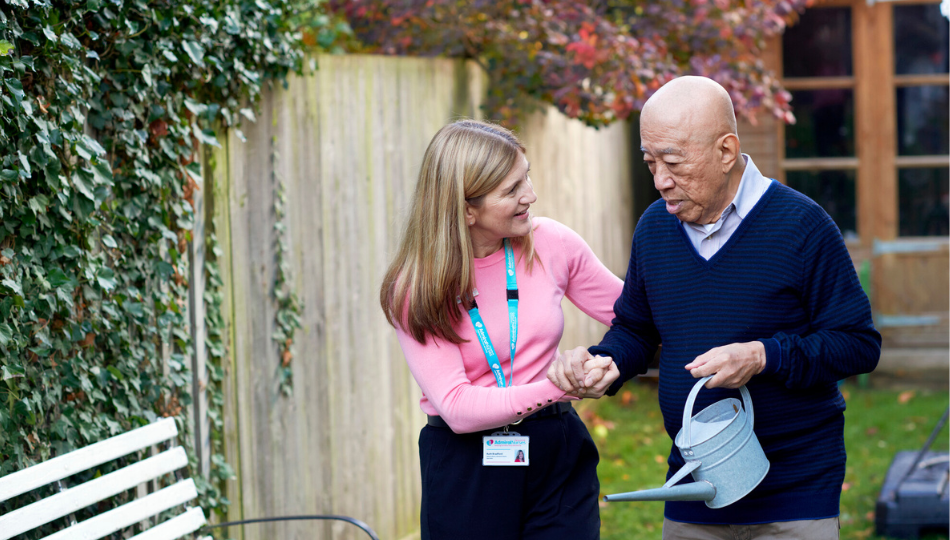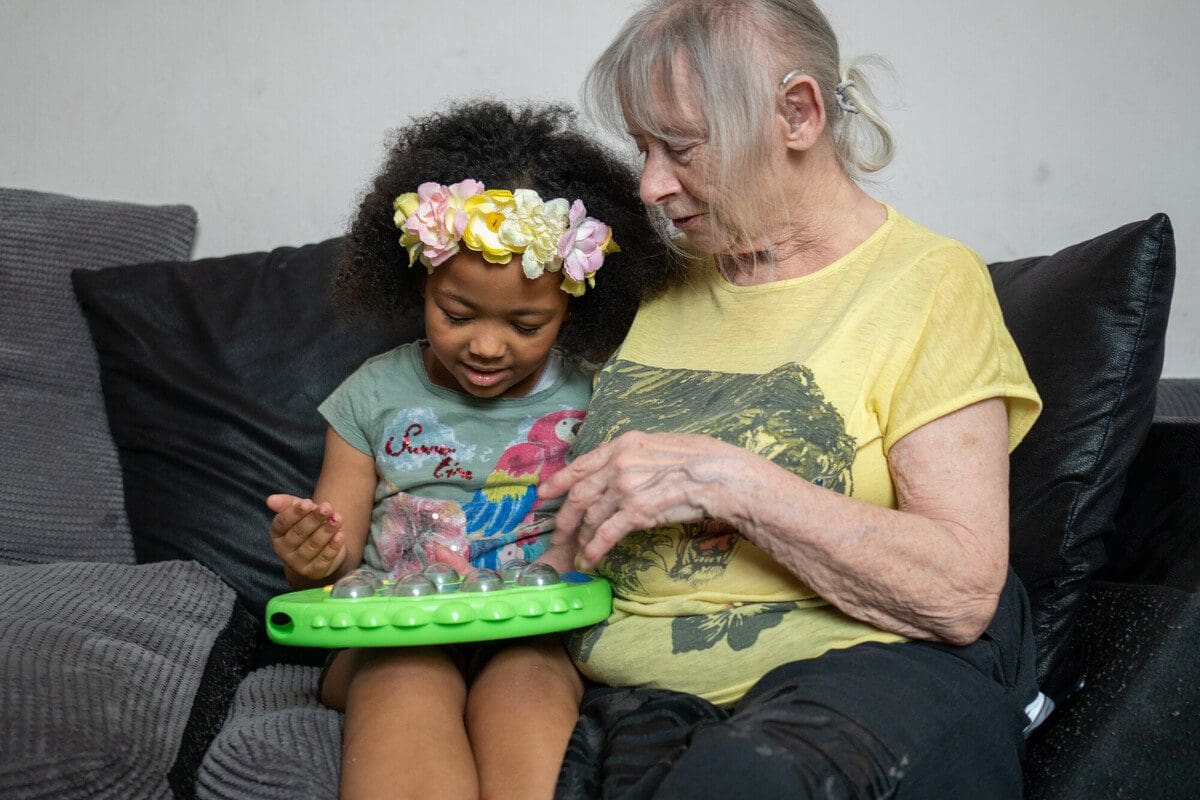Looking after yourself as a carer
Information to help you make sure you have a life outside of your caring responsibilities and that you get support from those around you.
Catherine Brahams’ best friend’s husband was diagnosed with young onset dementia aged 51. She shares her advice on how to support a friend in this situation.

Is 50 old? 50 may seem quite old if you’re a teenager; however, if one of your parents is affected by young onset dementia, and is around this age, you will feel differently about this. Just think about it. 50 is 15 years off retirement and even after that, most people should be able to live a further 15 years to enjoy leisure pursuits; see their children grow up, get married and have children of their own.
My best friend’s husband, who was diagnosed at the age of 51, probably already had the illness in his late 40s. Much of his outlandish behaviour was explained away by his eccentricity and his individuality; however, when he couldn’t calculate a simple restaurant bill or understand how to use his PIN and bank card, we knew that something was terribly wrong. His wife, Annie, is in her early 50s; their children are teenagers. They’re just a normal, nuclear family. Or rather, they were. Nothing is normal now.
As Annie’s best friend, I felt inextricably linked to their situation and the impact that Tom’s illness had on the rest of the family. We live about five miles from each other. We have been on holidays together. We have very few secrets from one another, if any. We’re very close.
It is not helpful to focus on all the elderly people that you know, or are related to, who may have had dementia late in life. It’s just not the same. They’ve had their life. Annie’s partner is only half-way through his.
Your relative has enjoyed seeing their children and grandchildren grow up. He may not even know who his children are by the time he reaches 70, if he lives that long anyway. So, you need to be understanding, be sympathetic and listen. Comparisons are not particularly helpful in the early stages of the diagnosis or illness.
As a friend, I could see that Annie was struggling with her husband’s volatile behaviour and that she was lurching from one crisis to another. There will be lots of crises, not one crisis. Too many to count. The police, social services, banks, retailers, neighbours and strangers will all be in touch with your friend. If she can’t cope, she will phone you and she will do that regularly. Let her. Don’t make her feel guilty. Of course, it won’t always be convenient but always phone her back or even send her a reassuring text.
Everyone’s case is unique. This is a phrase that you will hear on multiple occasions. It’s not particularly helpful but it does tell us that everyone’s experience is different.
Accompany your friend to the medical appointments: there is too much for them to take in on their own.
Even though we suspected that Tom had some form of dementia, or at one point we assumed he was suffering from a brain tumour, it was important that my friend was not on her own when her husband received the confirmation of his diagnosis. At that time, he was reasonably lucid, and he wanted to know his life expectancy. The doctor would not be drawn on this matter.
If you know someone whom you think is suffering from this devastating condition, you need to accompany your friend to the doctor or the hospital; this is because there is so much information to take in; so much advice to listen to; so much that can go wrong at this point, that your role will be to take notes, listen carefully and to ask straightforward questions. You will be more rational than your friend.
Dementia is a slow bereavement. There is no cure and no quick fix. You need to be there in the short and long-term.
If one partner has always taken care of the finances, and the other is less interested, he or she may need help in managing their affairs. If that’s not you, you may know someone (and he or she must be entirely trustworthy) who can help.
It’s imperative that you or your friend seeks professional advice as there are government benefits that can be accessed; the paperwork can be totally overwhelming and unnecessarily complicated.
Tom, who was very intelligent and astute with money before his illness, lost his ability to count. He could not understand the concept of addition or subtraction; to this end, he could not be trusted to manage any form of money, let alone a bank card. It felt cruel to take away his independence, but Power of Attorney had to be granted to his wife. He was allowed some pocket money but never more than £50.
Ask what you can do. It might just be doing the shopping or collecting the children from school. It might be cooking the family dinner once a week or giving your friend some respite, if that’s possible.
Friendship means that nothing is too much trouble. Never make your friend feel guilty for asking you for help or for phoning you seven or eight times a day. Even if you work full-time, you will have breaks. Check your mobile. Leave your friend a message.
Before my friend’s husband’s illness became advanced, he lived in the family home without a carer. It was a very difficult time. He was extremely untidy, even when he wasn’t ill, and somehow this trait was exacerbated when the dementia set in. He lost the ability to dress properly, and shaving was out of the question.
So, what your friend really needs at this point, is an opportunity to escape the chaos that has become synonymous with her home life. As long as someone responsible can stay with your friend’s partner – perhaps a former colleague or a relation or paid help – you can take your friend out for a daytrip, a cinema outing, a picnic, a swim or just a simple lunch. Anything is acceptable.
I am an ardent fan of the NHS. I think most of us are, especially after the Covid-19 pandemic. But the red tape that overwhelms ordinary people when their lives are totally disrupted by this distressing condition is simply dreadful.
One way to help your friend is to manage some of the bureaucracy on her behalf. Your support will be essential to her mental health and capacity to cope with the long journey that she faces, none of which will be smooth.
Even if your partner or your friend’s partner is eventually confined to a care home, there will be life beyond the dementia.
Annie’s children visit their father as often as they can. He is happy and well cared for; this has enabled them to be more accepting of his fate and a little less angry at theirs.
It is not easy. If you’re a young person whose mother or father has young onset dementia, it will feel incredibly unfair. You will think you’re the only person who has been dealt this awful card. But you’re not alone. Join groups; access as much help and support as you can. Tell your friends. You will not want to go on this journey by yourselves; it’s too hard.
Catherine Brahams is a published author. Her debut novel ‘Imprisoned by Love’ tells the story of Sophie Boswell, whose husband Michael receives a frontotemporal dementia diagnosis aged 49.
Information to help you make sure you have a life outside of your caring responsibilities and that you get support from those around you.

Help us raise vital funds, improve care and support for families facing dementia and spread the word about our specialist dementia nurses.

Sharing your story with Dementia UK can help to inspire and reassure others who may be going through similar things.